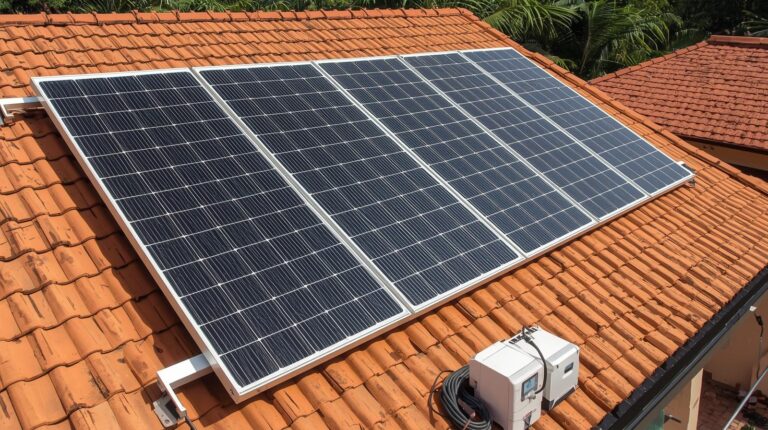In today’s real estate market, homeowners and potential buyers are increasingly prioritizing sustainability and energy efficiency. The integration of home power systems, particularly solar panels, has emerged as a compelling avenue for enhancing property values. Not only do these systems offer a reduction in energy costs, but they also align with a broader environmental consciousness that is becoming more prevalent among consumers.
While the initial investment may seem substantial, the long-term financial and ecological benefits are undeniable. However, the question remains: how significant is the impact of these systems on the actual market value of a home, and what are the broader implications for the real estate market? This discussion aims to explore these facets in greater depth, considering recent trends and data.
Key Takeaways
- Solar panels increase property values by about 4.1% or $15,000 on average.
- Homes with solar installations sell 20% faster than non-solar homes.
- Local rebates and the Federal Investment Tax Credit reduce installation costs.
- Energy-efficient upgrades like solar panels significantly lower electricity bills.
- Solar-equipped properties attract environmentally conscious buyers, enhancing marketability.
Real Estate Value and Market Trends
Investing in home solar power systems, such as whole home generators and solar panels, has proven to greatly boost property values and appeal to market trends that favor energy efficiency and sustainability.
By integrating solar energy systems, homeowners not only elevate their property value—typically seeing an increase of around 4.1% or roughly $15,000 for solar installations—but also align with the growing demand for sustainable living. This surge in value is a clear indicator of the market’s prioritization of energy-efficient upgrades.
Home buyers today are increasingly drawn to homes that promise reduced utility costs and environmental impact, making solar panels a compelling enhancement to marketability. Properties equipped with these systems tend to sell 20% faster than those without, indicating a strong preference for residences ready to deliver immediate energy savings and comfort.
Local incentives further sweeten the deal, amplifying the resale value by offering rebates that make initial investments in solar panels more attainable.
Thus, for those seeking to liberate themselves from rising energy costs and contribute to environmental conservation, upgrading to solar panels is not just a home improvement but a strategic, market-smart decision that guarantees both financial and ecological resilience.
Financing, Incentives, and Tax Implications
Exploring the array of financing options, incentives, and favorable tax implications can greatly reduce the initial financial burden of installing solar energy systems. Homeowners considering solar installations can leverage the Federal Investment Tax Credit (ITC), which currently offers a 26% tax credit, set to decrease to 22% in 2023. This significant tax credit directly diminishes the outlay required, enhancing the overall affordability of adopting solar energy.
In Texas, the addition of solar panels can boost property value by about $3.00 per watt, presenting not only an environmentally sound choice but also a financially astute investment. Local incentives further sweeten the deal; for instance, CPS Energy’s rebate of $2,500 directly cuts down initial costs, making solar technology more accessible.
Moreover, state and local tax credits, alongside potential cash rebates from utility companies, play a vital role in minimizing the economic impact of your solar system investment. For those seeking a manageable financing method, Property Assessed Clean Energy (PACE) financing allows homeowners to fund their solar energy enhancements through property taxes, thereby smoothing the path toward energy independence without disrupting their financial stability.
These incentives guarantee that your investment in solar energy is less burdensome, leading to reduced utility bills and a higher property value.
Related Post: Top 5 Federal Grants for Home Solar Panels.
Solar System Components, Installation, and Maintenance
Solar system components, their proper installation, and diligent maintenance are essential to maximizing the energy efficiency and financial returns of your home power investment. Selecting the right type of solar panels—monocrystalline for higher efficiency or polycrystalline for cost-effectiveness—can greatly influence your overall energy consumption and performance outcomes.
Successful installation hinges on meticulous planning and adherence to local regulations, guaranteeing that all permits are secured and that the system complies fully with building codes. This process not only safeguards your investment but also optimizes the operational efficiency of the solar panels.
Regular maintenance schedules must be adhered to, enhancing the longevity and efficiency of the system while also maintaining warranty coverage, which is vital for future financial considerations.
Consider the following key aspects:
- Type of Solar Panels: Choose between higher efficiency or cost-effectiveness.
- Compliance and Permits: Essential for legal installation and grid connection.
- Regular Maintenance: Important for sustaining performance and efficiency.
- Warranty Coverage: Protects your investment and guarantees resale value.
Environmental Impact and Energy Efficiency
Harnessing solar power not only curtails reliance on fossil fuels but also greatly diminishes greenhouse gas emissions, marking a significant step towards environmental stewardship and enhanced property value. By integrating solar systems into residential properties, homeowners can play an essential role in promoting sustainable living while simultaneously boosting their property values.
The adoption of solar panels is not merely an environmentally conscious decision but a financially savvy one as well. Homeowners who invest in solar energy can reduce electricity costs by more than 50%, providing significant savings over the lifespan of the system. This reduction in operational costs makes solar-equipped homes highly attractive on the real estate market, appealing to buyers who prioritize energy efficiency and lower utility bills.
Moreover, properties featuring energy-efficient upgrades, such as solar systems, are not only more desirable but also command a higher market value. Research shows that such sustainable home improvements can increase property values by an average of 4.1%.
This financial uplift, combined with the environmental benefits of reduced emissions, positions solar energy as a compelling choice for those seeking to enhance both their living environment and investment returns. Consequently, solar energy stands out as a key player in the future of real estate, merging ecological responsibility with economic advantage.
Role of Real Estate Professionals and Buyer Education
Real estate professionals play a pivotal role in educating buyers about the considerable financial and environmental benefits of solar-powered homes. By adeptly maneuvering through the complexities of solar technology and its impact on property value, agents empower clients to make informed decisions that align with both their financial goals and environmental values.
Key aspects of this educational role include:
- Financial Benefits: Highlighting how homes with solar panels not only fetch a higher market price—typically $15,000 more—but also offer long-term savings on energy bills.
- Federal Tax Credits and Local Incentives: Guiding buyers through the myriad of available solar financing options, including federal tax credits and state rebates, which can noticeably reduce the upfront costs of solar installations.
- Market Demand: Educating buyers on the increasing demand for energy-efficient homes, positioning solar energy systems as a competitive edge in the real estate market.
- Local Laws: Ensuring buyers are informed about local laws and incentives related to solar installations, thereby facilitating a smoother property transaction and installation process.
Real estate professionals equipped with knowledge about solar energy not only enhance their service quality but also contribute to a sustainable future, appealing to a broad range of eco-conscious buyers and liberating them from traditional, less sustainable energy dependencies.
Conclusion
In summary, integrating solar power systems into residential properties not only aligns with current market trends favoring energy efficiency but also offers substantial financial benefits through increased property values and reduced energy costs.
With the support of tax credits and incentives, homeowners are positioned to capitalize on both economic and environmental advantages. Real estate professionals play an essential role in educating buyers about these benefits, further driving the demand for homes equipped with sustainable technology.




